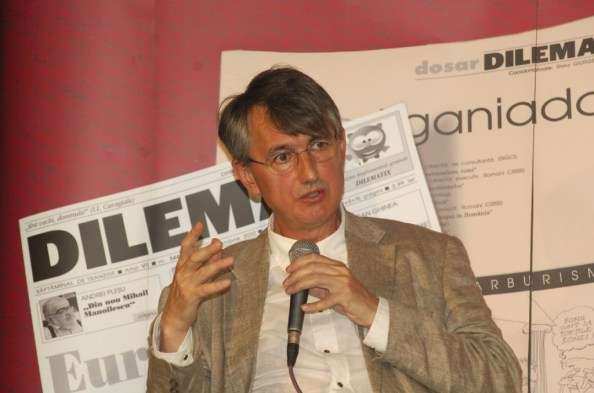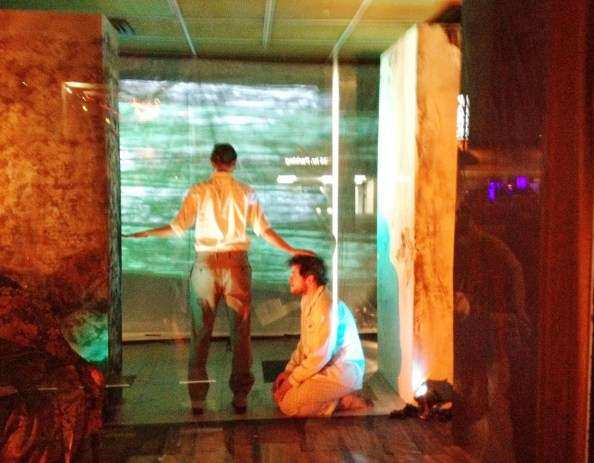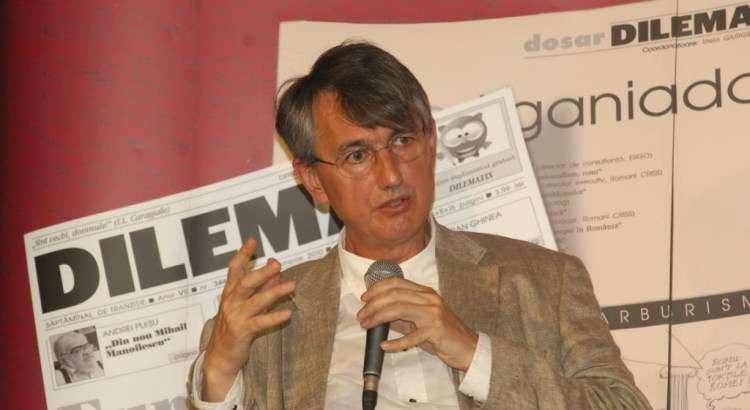BUCHAREST — In less than 15 days, the Romanian Cultural Institutes around the world will no longer be spaces for cultural diplomacy and international understanding. Instead, they will become community outposts serving only the needs of the Romanian diaspora.
The government of Prime Minister Victor Ponta passed an emergency order Wednesday putting the cultural institute (known as the ICR among Romanians) under the control of the Romanian Senate — a decision criticized by Romanian artists and staff members as an attempt to take political control of the institute.
With this impending re-structuring, Romania’s Cultural Institute (RCI), which has 17 offices abroad including in New York, Tel Aviv and Paris, has become the latest football in a gruesome political fight between Romanian President Traian Basescu and Prime Minister Victor Pona. President Basescu is one of Ponta’s political rivals.
The law, effective in 15 days, changes the mission of the cultural institute from representing Romanian culture abroad to serving the Romanian communities abroad. It will no longer promote Romanian culture to both Romanian and foreign audiences anymore. Instead it will bring Romanian culture to the Romanian diaspora, in Romanian language. The law also changes current management and submits the institute to the whims of the senate politics.

A group of prominent Romanian artists have accused the new center-left government Thursday of trying to destroy the Romanian Cultural Institute, the main promoter of the country’s culture abroad.
“The ICR works very, very well. There is absolutely no reason to change anything in its structure,” said movie director Cristi Puiu, winner of many awards at the Cannes Film Festival. Puiu is a leading member of a new wave of Romanian directors that emerged after the country’s communist dictator Nicolae Ceausescu fell in 1989.
Joining Cristi Puiu in defending RCI were Andrei Şerban, Alexandru and Ada Solomon, Grigore Leşe, Dan Dediu, Mihai Mihalcea, Ada Milea, Voicu Rădescu, Irina Margareta Nistor and Doina Jelea, among others.
Prior to the passing of the ordinance, the Cultural Institute was under the audiences of the Romanian president. Prime Minister Ponta has criticized the Cultural Institute, saying it was “politicized and lacked transparency.” Ponta defended the move, saying the institute would be less politicised under senate control, whereas it had until now been under the control of the Romanian presidency. Ponta issued the ordinance as a matter of “national urgency.”
The urgency? The feeling of national belonging within Romanian communities abroad is permanently threatened by the current organization of the RCI.
Meanwhile, the Cultural Institute’s current management has denied ever coming under any kind of political pressure.
In response to the charge of wasting public money, RCI President Horia Roman Patapievici said that half the ICR’s 2011 projects were carried out in partnership with foreign institutions, which also brought funding, while one in five of the institute’s events didn’t cost anything. Patapievici said the organization’s budget reports speak for themselves and show quality programs from minimal public funding.
In an article in Romania-Insider, he described the accusations as “shameful” and stated that he, and the ICR, worked autonomously without political interference or any kind of political agenda. Bringing the ICR under senate control would, according to Patapievici, lead to the organization being more politicized, as opposed to the current presidential control, which he described as “symbolic.”
Until now the Institute has been under the authority of the President of Romania, who only appointed the President of the Institute but couldn’t interfere in the programming or structure. This structure was considered “political control” by the government, an urgent matter which couldn’t be delayed.
Interestingly, the new law insists that the vice presidents of RCI cannot be affiliated to political parties, while making no mention about the political affiliation of the RCI president. It is therefore possible that the president could be a member of the political party.
“Putting the RCI under parliamentary control is the democratic choice and aims to make the institution more transparent. Use of public funds must be above any suspicion and only through transparent and democratic parliamentary control this can be achieved,” said government spokesman, Andrei Zaharescu. —in the theater of One World

_____________________________________________________________________
What follows is the full text of the new law which re-organizes the Romanian Cultural Institute, thus dissolving its current purpose in less than 15 days.
Ordinance No. 27 of 13.06.2023
regarding some measures in the cultural field
Document issued by: the Government of Romania
Document Published in the Official State Monitor. 400 of June 14, 2023
Given the need to enhance and amplify different forms of cultural relations with Romanian communities abroad, in order to preserve and perpetuate national identity, a goal of particular importance in the context of globalization, including cultural globalization,
- taking into consideration the fact that reaching this goal requires parliamentary control in the organization and functioning of the Romanian Cultural Institute through the Romanian Senate, in its quality of decisional chamber for adopting draft laws and legislative proposals on foreign policy, and which has permanent commissions specialized in this area such as the Committee on Foreign Affairs, the European Affairs Committee and the Commission for Romanians Everywhere,
- taking into account the need for spending public money by the Romanian Cultural Institute, in complete legality, by avoiding any financial accounting irregularities, such as those identified, in time, by the reports of the Romanian Court of Accounts,
- considering the dispositions of art. 116 of the Romanian Constitution, republished, which governs the structure of central government, respectively ministries organized in subordination to the Government and other bodies which may be organized in subordination to the Government or Ministries, or as autonomous administrative authorities,
- given the general disposition of art. 111. Paragraph 1 of the Constitution, which states government and the other organs of public administration are subject to parliamentary control, taking into consideration the need to respect the constitutional framework through reorganization of the Romanian Cultural Institute as an autonomous administrative authority, with legal personality, submitted to parliamentary control,
- taking into account that not adopting the measures proposed in this law will lead, on one hand, to the extension of the highly negative effects of some state of affairs that tend to affect, permanently, the sense of belonging to the Romanian nation of those who are already settled, temporarily, in other states, and on the other hand, to maintaining of some dysfunctionalities referring to the organization and functioning of the Romanian Cultural Institute,
- considering that all evidence presented above concerns the public interest, so by this it consists as an emergency and extraordinary situation, the ruling of which cannot be postponed according to art.
Article 115. (4) of the Romanian Constitution, republished, the Government of Romania adopts this law.
Article I
The Romanian Cultural Institute, the national public institution with legal personality under the authority of the President of Romania, is reorganized as an autonomous administrative authority, with legal personality, under parliamentary control.
Article II
Law no. 356/2003 on the establishment, organization and functioning of the Romanian Cultural Institute, published in the Official Gazette, Part I, no. 529 of July 23, 2003, as amended and supplemented, is hereby amended as follows:
A. In Article 1 (1) reads as follows:
Article 1
(1) The Romanian Cultural Institute, hereinafter the Institute, is organized and operates as an autonomous administrative authority, with legal personality, under parliamentary control.
Two. Article 6 (2) read as follows:
(2) The governing board is chaired by the President of the Institute and has the following composition:
- the President Institute;
- One member appointed by the President;
- One member appointed by the Prime Minister;
- A Secretary of State appointed by the Minister of Foreign Affairs, by order;
- A Secretary of State appointed by the Minister of Culture and National Heritage, by order;
- A Secretary of State appointed by the Minister of Education, Youth and Sports, by order;
- the President of the Romanian Academy or a Vice President designated by him;
- 14 members appointed by the Senate, by the vote of majority of the Senators present at the time of vote, from which 7 members proposed by the creators’ associations and unions and 7 members appointed by the Permanent Bureau of the Senate.
Three. Article 6 (4) is abolished.
Four. Article 8 (3) reads as follows:
(3) Extraordinary Council meetings of the Institute can be called at the request of the Permanent Bureau of the Senate, Senate Standing Bureau, the President of the Institute or a quarter of all members. The meetings shall be called through any means of communication, stating the agenda, date, time and place.
Five. Article 12 (1) reads as follows:
Article 12
(1) The operative management of the Institute is provided by a president with the rank of Secretary of State, assisted by two vice presidents, with the rank of Secretaries of State, who are appointed to or removed from office by the Senate, through the majority of votes of those present, and at the proposal of the Permanent Bureau of the Senate. The Vice President mandate is four years, with possibility of renewal. The position of Vice-President of the Institute is incompatible with membership of a political party.
6. Article 14 reads as follows:
Article 14
The maximum number of positions at the Institute is 184, excepting dignitaries.
Article III
In term of 15 days after the effective date of this ordinance, the Senate will appoint the operative management of the Institute and its Board members whose appointment to office is the Senate’s responsibility, in accordance to Art. Article 6. (2) of Law no. 356/2003 on the establishment, organization and functioning of the Romanian Cultural Institute, with subsequent amendments and the amendments made by this law.
PRIME MINISTER
VICTOR-VIOREL PONTA
Countersigned by:
Minister of Culture and National Heritage,
Mircea Diaconu
Secretary General of the Government,
Ion Moraru
Foreign Minister
Andrei Marga
Deputy Prime Minister and Finance Minister
Florin Georgescu

Related articles
- YOU HEARD IT HERE FIRST | Play excerpt | Saviana Stanescu’s “4 Alice,” part 2 of “The Window” at Romanian Cultural Institute in New York (theaterofoneworld.org)
- Performance review: Seeing the Romanian Cultural Institute’s “Window” through Alice’s looking glass (theaterofoneworld.org)
- Performance review: Watch a storefront story from a New York sidewalk in this Romanian-American collaboration (theaterofoneworld.org)
- Romania mania (chicagoreader.com)
- Romanian Government Collapses (theepochtimes.com)
- Romania left-wing opposition leader named prime minister (newsinfo.inquirer.net)
- Romania’s government does well in local elections (seattletimes.nwsource.com)





Shame! Can we do anything?
Hi Izabela:
Sign this petition:
http://www.petitieonline.ro/petitie/contestarea_oug_cu_privire_la_functionarea_institutului_cultural_roman-p28379058.html
Second petition:
http://www.romaniacurata.ro/ltfont-colorblackgtcare-e-urgenta-de-la-icrlt-fontgtltbrgt-protest-al-2917.htm#.T9scBIg2F_M.facebook
Thank you.